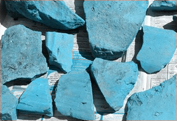|
 Mellor
Archaeological Trust are once again organising a summer season of
excavations on their site, which lies just 7 miles east of Stockport (on the
very edge of the Peak District). For the last 7 years the Trust has been working towards
building up a complete history of the occupation here, which, they believe,
may go back as much as 10,000 years. They
have been able to do this mainly through the enthusiasm of local volunteers (70 in
all), but also with help from the professionals such as the Greater
Manchester and Manchester University Archaeology Units. Mellor
Archaeological Trust are once again organising a summer season of
excavations on their site, which lies just 7 miles east of Stockport (on the
very edge of the Peak District). For the last 7 years the Trust has been working towards
building up a complete history of the occupation here, which, they believe,
may go back as much as 10,000 years. They
have been able to do this mainly through the enthusiasm of local volunteers (70 in
all), but also with help from the professionals such as the Greater
Manchester and Manchester University Archaeology Units.
It all started in 1995 when John and Ann Hearle
saw marks on their lawn which carried on into the adjoining farmers field,
and wanted to find out what had caused them. In 1997 they approached Peter
Arrowsmith from the UMAU who organised a resistivity survey. The results
where positive so the following year trial trenching began and it was in
one of these trenches that a remarkable discovery was made. On one side, a
deep defensive ditch was uncovered about 4 metres wide and over 2 metres
deep.
Full-scale excavations followed the next year and it
soon became clear that they had discovered an Iron Age Hill Fort
surrounded by what is now thought to be a double-ditch system. Finds were
also turning up from a multitude of other periods, demonstrating the
site's long history of occupation. These range from Mesolithic flints to
Post-Medieval pottery, and include this fine
 Bronze-age
dagger, some Iron Age pottery and 4 Roman brooches. Funding for the
project has been received from various sources including the Local
Heritage Initiative, Stockport MBC and local fund raising activities. Open
days are planned for 2nd and 3rd September, but if
enough people are interest, they will accept a private visit.
If you want to learn more, their website is:
www.mellorarchaeology.org.uk Bronze-age
dagger, some Iron Age pottery and 4 Roman brooches. Funding for the
project has been received from various sources including the Local
Heritage Initiative, Stockport MBC and local fund raising activities. Open
days are planned for 2nd and 3rd September, but if
enough people are interest, they will accept a private visit.
If you want to learn more, their website is:
www.mellorarchaeology.org.uk
CBA-NW
Spring Meeting
Despite some last minute changes to speakers, last
month's meeting turned out to be a great success with over 65 attendees.
I would like to thank all those who contributed, particularly Tom Glover
for chairing the day and Jack Smith for arranging the venue (including a
very pleasant visit to Euxton Parish Church).
John Rabbitt and Dot Waring presented their searches for the Roman
Road in Eccles and Darwen areas respectively, (demonstrating quite adeptly
that community archaeology is alive and doing quite well in our neck of
the woods as well).
I
might be biased but I thought Dot‘s talk on Darwen Archaeological
Society's excursions into experimental archaeology were particularly
entertaining. There was more community archaeology in the afternoon with
Peter Connolly's talk on the highly successful ‘Dig Manchester'
project. We will of course be booking all of these for our society talks
in the coming year.
Chorlton
Fold
John
Rabbitt is also pressing on with his plans for an investigation of the
Roman Road in the Chorlton Fold area.
Last month Mark, Joe and I went down there for a site visit with
representatives from all interested parties. John pointed out areas where
he thought the road might be found and a way forward was agreed, including
some trial trenching and a possible resistivity survey.
Whitaker, writing in the 18th century, describes the
road turning north at this point toward the A6, on its way to Blackrod (he
believed that this was where Coccium lay). Sibson, however, reporting in
his early 19th century, refuted this saying the road did not
deviate as it went straight through Chorlton Fold on its way to Wigan.
Next WAS Meeting
Wednesday 7th June at the District
Scout HQ (Baden Powell Centre) in Greenough Street, starting at 7.30 pm as
usual. This month we are
having Anne Worsley from Edge Hill college near Ormskirk, whose visit had
to be unavoidably postpone last year. Her talk is on the fascinating
subject of Forensic Archaeology.
Hope to see you there. B.A.
|



